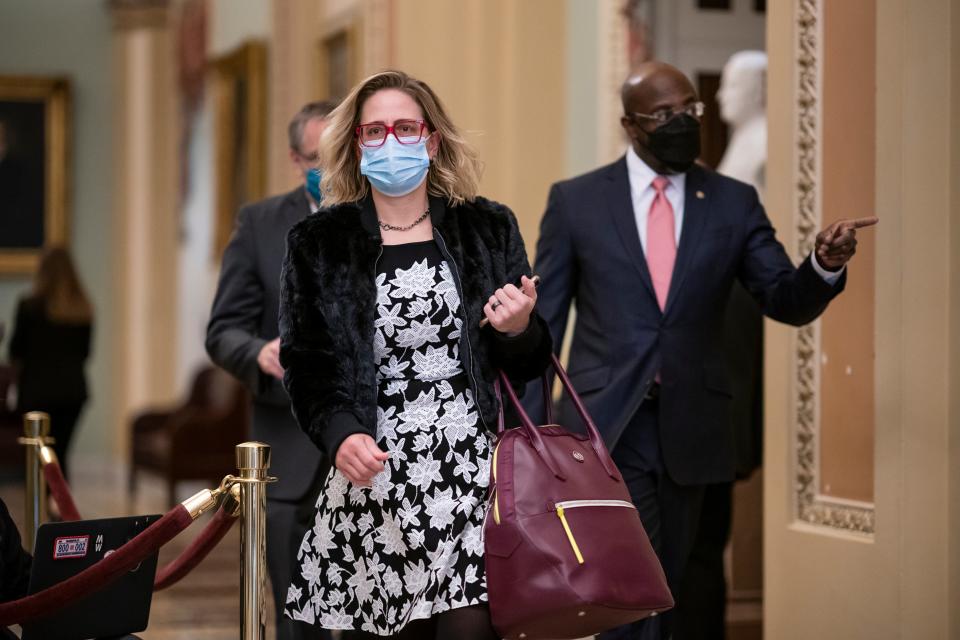Kyrsten Sinema: Democratic senator’s office suggests criticism over vote against raising minimum wage is sexist

Senator Kyrsten Sinema (D—AZ) was forced to defend herself amid sharp criticism from within the Democratic Party about her decision to vote against a gradual increase of the federal minimum wage after she gave a thumbs down to the measure on the Senate floor on Friday.
The senator released a statement as a video of her rejecting the $15 minimum wage measure in the new Covid-19 relief package made the rounds, saying she understood “what it is like to face tough choices while working to meet your family’s most basic needs.”
“No person who works full time should live in poverty,” the statement continued, adding: “Senators in both parties have shown support for raising the federal minimum wage and the Senate should hold an open debate and amendment process on raising the minimum wage, separate from the Covid-focused reconciliation bill.”
However, Ms Sinema was already facing backlash by her handling of the vote, as critics slammed her for appearing to “make a show” of her decision by delivering the overemphasized thumbs down amid the Senate vote-a-rama. Her office later decried such criticism as sexist, telling HuffPost in a statement: “Commentary about a female senator’s body language, clothing, or physical demeanor does not belong in a serious media outlet.”
No matter what you think of @kyrstensinema's vote, these optics are horrible.
There's no rule that requires Senators to vote the way she did (a la John McCain healthcare vote in 2017).
You may think people don't deserve to be paid more, but you don't need to make a show of it. pic.twitter.com/Cj0iYcoDPH— Yashar Ali 🐘 (@yashar) March 5, 2021
Here’s @SenatorSinema walking on to the floor, patting Mitch McConnell on the back, looking back to make sure he sees her, then giving the thumbs down to a $15 minimum wage https://t.co/U4yqXXFrRG
— Ryan Grim (@ryangrim) March 6, 2021
Did Sinema really have vote against a $15 minimum wage for 24 million people like this? pic.twitter.com/Jv0UXLKLHI
— Sawyer Hackett (@SawyerHackett) March 5, 2021
Some compared Ms Sinema’s performative vote to when the late Senator John McCain (R—AZ) voted against a repeal of the Affordable Care Act in a historic move by flashing a thumbs down — however, in this instance, it was Democrats expressing their frustrations over Ms Sinema’s lack of support for the minimum wage increase.
The vote to increase the federal minimum wage to $15 came amid a series of debates on measures surrounding the proposed $1.9 trillion relief plan to address the coronavirus pandemic, which featured direct payments to a majority of Americans and funding for vaccinations and industries impacted by the public health crisis.
Several centrist Democrats and Republicans said the minimum wage issue should not be included in the reconciliation efforts, while others have warned the Senate has limited opportunities to increase the minimum wage and was losing a critical chance to benefit workers struggling to keep up with payments amid the pandemic.
In her statement on Friday, Ms Sinema said she would “keep working with colleagues in both parties to ensure Americans can access good-paying jobs, quality education, and skills training to build more economically secure lives for themselves and their families.”
The measure to include the $15 minimum wage was led by Senator Bernie Sanders (D—VT) and received widespread support within the Democratic Party, particularly in the House. Senator Mark Kelly (D—AZ), who was elected last year, voted in favor of the measure.

 Yahoo Movies
Yahoo Movies 